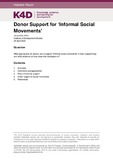| dc.contributor.author | Hicks, Jacqueline | |
| dc.coverage.spatial | Various countries | en |
| dc.date.accessioned | 2022-07-15T11:57:53Z | |
| dc.date.available | 2022-07-15T11:57:53Z | |
| dc.date.issued | 2022-04-29 | |
| dc.identifier.citation | Hicks, J. (2022). Donor Support for ‘Informal Social Movements’ K4D Helpdesk Report 1140. Institute of Development Studies. DOI: 10.19088/K4D.2022.085 | en |
| dc.identifier.uri | https://opendocs.ids.ac.uk/opendocs/handle/20.500.12413/17542 | |
| dc.description.abstract | “Social movements” are by definition informal or semi-formal, as opposed to the formal structure of a stable association, such as a club, a corporation, or a political party. They are relatively long lasting over a period of weeks, months, or even years rather than flaring up for a few hours or a few days and then disappearing (Smelser et al., 2020). There is a substantial and growing body of work dedicated to social movements, encompassing a wide range of views about how to define them (Smelser et al., 2020). This is complicated by the use of other terms which shade into the idea of “social movements”, such as grass-roots mobilisation/ movements, non-traditional civil society organisations, voluntary organisations, civic space, new civic activism, active citizenship, to name a few. There is also an implied informality to the term “social movements”, so that the research for this rapid review used both “social movement” and “informal social movement”. Thus this rapid review seeks to find out what approaches do donors use to support “informal social movements” in their programming, and what evidence do they base their strategies on. The evidence found during the course of this rapid review was drawn from both the academic literature, and think-tank and donor reports. The academic literature found was extremely large and predominantly drawn from single case studies around the world, with few comparative studies. The literature on donor approaches found from both donors and think tanks was not consistently referenced to research evidence but tended to be based on interviews with experienced staff and recipients. | en |
| dc.description.sponsorship | Foreign, Commonwealth and Development Office (FCDO) | en |
| dc.language.iso | en | en |
| dc.publisher | Institute of Development Studies | en |
| dc.relation.ispartofseries | K4D Helpdesk;1140 | |
| dc.rights.uri | https://www.nationalarchives.gov.uk/doc/open-government-licence/version/3/ | en |
| dc.subject | Aid | en |
| dc.title | Donor Support for ‘Informal Social Movements’ | en |
| dc.type | Helpdesk | en |
| dc.rights.holder | © Crown copyright 2022 | en |
| dc.identifier.doi | 10.19088/K4D.2022.085 | |
| dcterms.dateAccepted | 2022-04-29 | |
| rioxxterms.funder | Default funder | en |
| rioxxterms.identifier.project | K4D | en |
| rioxxterms.version | VoR | en |
| rioxxterms.versionofrecord | DOI: 10.19088/K4D.2022.085 | en |
| rioxxterms.funder.project | 42a141a4-4b80-406f-9c57-3bb186f136c1 | en |

